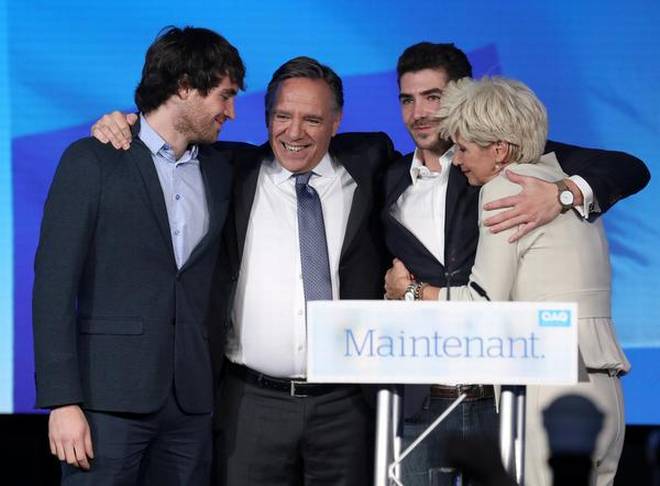Coalition Avenir Quebec is expected to win a majority of seats in Canada’s second most populous province
The centre-right Coalition Avenir Quebec is on track to win power for the first time in Canada’s Quebec province on Monday, dealing a blow to the Liberal incumbents and allowing the party to make good on its promises to curb immigration.
The business-friendly CAQ is expected to win a majority of seats in Canada’s second most populous province, according to early results from Elections Quebec and network projections.
“My team and I are very eager to get to work for you,” Legault said on Monday night on Twitter.
The CAQ win would follow a shift to the right in Ontario, where Premier Doug Ford’s Progressive Conservative government swept to power in June, ending 15 years of Liberal rule.
Quebec’s Liberals held power for 13 out of the last 15 years.
Legault campaigned on a controversial plan to take in 10,000 fewer immigrants a year and to expel new residents who fail tests on French and Quebec values within three years.
“Quebecers have clearly indicated their desire for change,” Liberal leader and former Quebec Premier Philippe Couillard said in a concession speech, adding that he would reflect on his political future.
Elections Quebec said the CAQ was ahead in 73 out of the 125 seats in the provinces legislature, with the Liberals in second place with 32 seats.
The election in the mostly French-speaking province, home to the majority of Canada’s influential dairy farmers, came as Prime Minister Justin Trudeau’s Liberal government decided to open up the country’s dairy industry to the United States, as part of concessions made to strike a last-minute deal for a renegotiated North American Free Trade Agreement.
Mr. Trudeau congratulated Legault in a statement for the winning CAQ majority. His Liberals, which are betting on gains in Quebec to offset expected losses elsewhere in a 2019 federal election, could find themselves clashing with the CAQ on changes to the protectionist dairy system.
Legault had called the deal “disappointing” earlier on Monday and said he would look at “all options” to defend the province’s farmers.
Trade and the question of how many outsiders should be let into the province had eclipsed arguments over separatism that have dominated politics in Quebec in recent decades. Early results show the separatist Parti Quebecois running virtually neck and neck with the left-leaning Quebec Solidaire to achieve the 12 seats needed to obtain official party status.
CAQ is not expected to make any major economic changes from the Liberals which paid down debt and reported successive balanced budgets, boosting the economy, said Robert Kavcic, senior economist at BMO Capital Markets.








